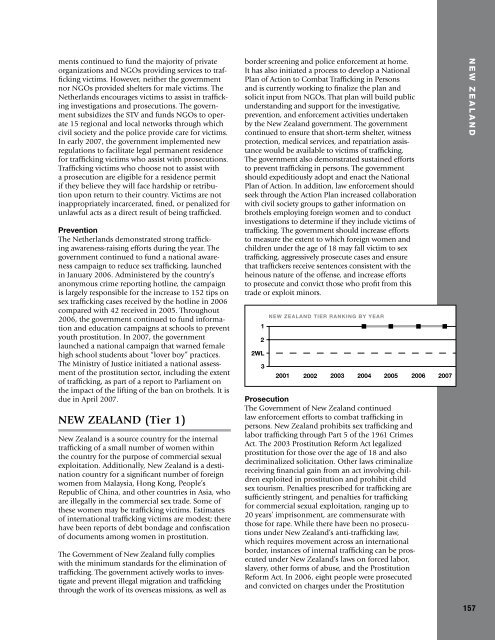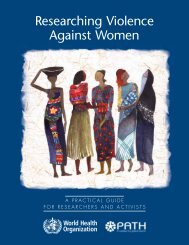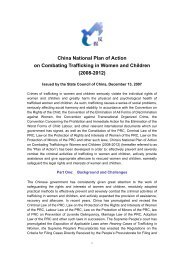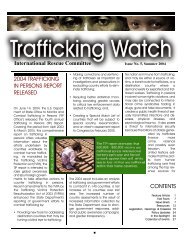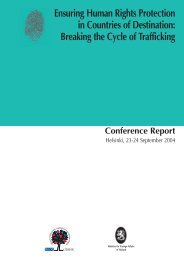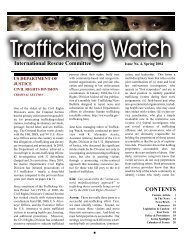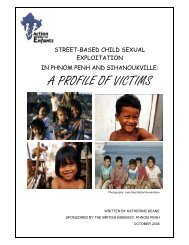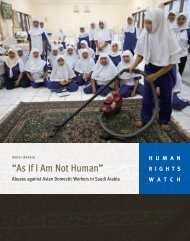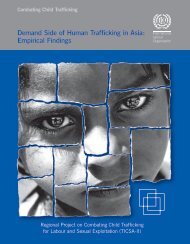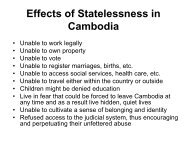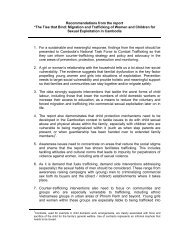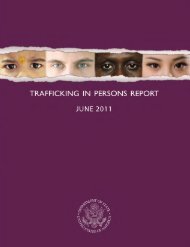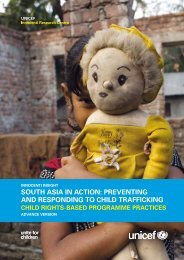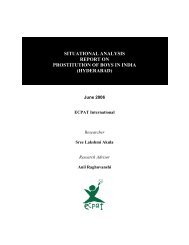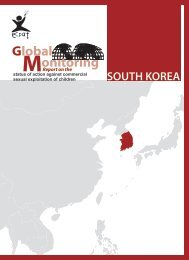2007 Trafficking in Persons Report - Center for Women Policy Studies
2007 Trafficking in Persons Report - Center for Women Policy Studies
2007 Trafficking in Persons Report - Center for Women Policy Studies
Create successful ePaper yourself
Turn your PDF publications into a flip-book with our unique Google optimized e-Paper software.
ments cont<strong>in</strong>ued to fund the majority of private<br />
organizations and NGOs provid<strong>in</strong>g services to traffick<strong>in</strong>g<br />
victims. However, neither the government<br />
nor NGOs provided shelters <strong>for</strong> male victims. The<br />
Netherlands encourages victims to assist <strong>in</strong> traffick<strong>in</strong>g<br />
<strong>in</strong>vestigations and prosecutions. The government<br />
subsidizes the STV and funds NGOs to operate<br />
15 regional and local networks through which<br />
civil society and the police provide care <strong>for</strong> victims.<br />
In early <strong>2007</strong>, the government implemented new<br />
regulations to facilitate legal permanent residence<br />
<strong>for</strong> traffick<strong>in</strong>g victims who assist with prosecutions.<br />
<strong>Traffick<strong>in</strong>g</strong> victims who choose not to assist with<br />
a prosecution are eligible <strong>for</strong> a residence permit<br />
if they believe they will face hardship or retribution<br />
upon return to their country. Victims are not<br />
<strong>in</strong>appropriately <strong>in</strong>carcerated, f<strong>in</strong>ed, or penalized <strong>for</strong><br />
unlawful acts as a direct result of be<strong>in</strong>g trafficked.<br />
Prevention<br />
The Netherlands demonstrated strong traffick<strong>in</strong>g<br />
awareness-rais<strong>in</strong>g ef<strong>for</strong>ts dur<strong>in</strong>g the year. The<br />
government cont<strong>in</strong>ued to fund a national awareness<br />
campaign to reduce sex traffick<strong>in</strong>g, launched<br />
<strong>in</strong> January 2006. Adm<strong>in</strong>istered by the country’s<br />
anonymous crime report<strong>in</strong>g hotl<strong>in</strong>e, the campaign<br />
is largely responsible <strong>for</strong> the <strong>in</strong>crease to 152 tips on<br />
sex traffick<strong>in</strong>g cases received by the hotl<strong>in</strong>e <strong>in</strong> 2006<br />
compared with 42 received <strong>in</strong> 2005. Throughout<br />
2006, the government cont<strong>in</strong>ued to fund <strong>in</strong><strong>for</strong>mation<br />
and education campaigns at schools to prevent<br />
youth prostitution. In <strong>2007</strong>, the government<br />
launched a national campaign that warned female<br />
high school students about “lover boy” practices.<br />
The M<strong>in</strong>istry of Justice <strong>in</strong>itiated a national assessment<br />
of the prostitution sector, <strong>in</strong>clud<strong>in</strong>g the extent<br />
of traffick<strong>in</strong>g, as part of a report to Parliament on<br />
the impact of the lift<strong>in</strong>g of the ban on brothels. It is<br />
due <strong>in</strong> April <strong>2007</strong>.<br />
NEW ZEALAND (Tier 1)<br />
New Zealand is a source country <strong>for</strong> the <strong>in</strong>ternal<br />
traffick<strong>in</strong>g of a small number of women with<strong>in</strong><br />
the country <strong>for</strong> the purpose of commercial sexual<br />
exploitation. Additionally, New Zealand is a dest<strong>in</strong>ation<br />
country <strong>for</strong> a significant number of <strong>for</strong>eign<br />
women from Malaysia, Hong Kong, People’s<br />
Republic of Ch<strong>in</strong>a, and other countries <strong>in</strong> Asia, who<br />
are illegally <strong>in</strong> the commercial sex trade. Some of<br />
these women may be traffick<strong>in</strong>g victims. Estimates<br />
of <strong>in</strong>ternational traffick<strong>in</strong>g victims are modest; there<br />
have been reports of debt bondage and confiscation<br />
of documents among women <strong>in</strong> prostitution.<br />
The Government of New Zealand fully complies<br />
with the m<strong>in</strong>imum standards <strong>for</strong> the elim<strong>in</strong>ation of<br />
traffick<strong>in</strong>g. The government actively works to <strong>in</strong>vestigate<br />
and prevent illegal migration and traffick<strong>in</strong>g<br />
through the work of its overseas missions, as well as<br />
border screen<strong>in</strong>g and police en<strong>for</strong>cement at home.<br />
It has also <strong>in</strong>itiated a process to develop a National<br />
Plan of Action to Combat <strong>Traffick<strong>in</strong>g</strong> <strong>in</strong> <strong>Persons</strong><br />
and is currently work<strong>in</strong>g to f<strong>in</strong>alize the plan and<br />
solicit <strong>in</strong>put from NGOs. That plan will build public<br />
understand<strong>in</strong>g and support <strong>for</strong> the <strong>in</strong>vestigative,<br />
prevention, and en<strong>for</strong>cement activities undertaken<br />
by the New Zealand government. The government<br />
cont<strong>in</strong>ued to ensure that short-term shelter, witness<br />
protection, medical services, and repatriation assistance<br />
would be available to victims of traffick<strong>in</strong>g.<br />
The government also demonstrated susta<strong>in</strong>ed ef<strong>for</strong>ts<br />
to prevent traffick<strong>in</strong>g <strong>in</strong> persons. The government<br />
should expeditiously adopt and enact the National<br />
Plan of Action. In addition, law en<strong>for</strong>cement should<br />
seek through the Action Plan <strong>in</strong>creased collaboration<br />
with civil society groups to gather <strong>in</strong><strong>for</strong>mation on<br />
brothels employ<strong>in</strong>g <strong>for</strong>eign women and to conduct<br />
<strong>in</strong>vestigations to determ<strong>in</strong>e if they <strong>in</strong>clude victims of<br />
traffick<strong>in</strong>g. The government should <strong>in</strong>crease ef<strong>for</strong>ts<br />
to measure the extent to which <strong>for</strong>eign women and<br />
children under the age of 18 may fall victim to sex<br />
traffick<strong>in</strong>g, aggressively prosecute cases and ensure<br />
that traffickers receive sentences consistent with the<br />
he<strong>in</strong>ous nature of the offense, and <strong>in</strong>crease ef<strong>for</strong>ts<br />
to prosecute and convict those who profit from this<br />
trade or exploit m<strong>in</strong>ors.<br />
Prosecution<br />
The Government of New Zealand cont<strong>in</strong>ued<br />
law en<strong>for</strong>cement ef<strong>for</strong>ts to combat traffick<strong>in</strong>g <strong>in</strong><br />
persons. New Zealand prohibits sex traffick<strong>in</strong>g and<br />
labor traffick<strong>in</strong>g through Part 5 of the 1961 Crimes<br />
Act. The 2003 Prostitution Re<strong>for</strong>m Act legalized<br />
prostitution <strong>for</strong> those over the age of 18 and also<br />
decrim<strong>in</strong>alized solicitation. Other laws crim<strong>in</strong>alize<br />
receiv<strong>in</strong>g f<strong>in</strong>ancial ga<strong>in</strong> from an act <strong>in</strong>volv<strong>in</strong>g children<br />
exploited <strong>in</strong> prostitution and prohibit child<br />
sex tourism. Penalties prescribed <strong>for</strong> traffick<strong>in</strong>g are<br />
sufficiently str<strong>in</strong>gent, and penalties <strong>for</strong> traffick<strong>in</strong>g<br />
<strong>for</strong> commercial sexual exploitation, rang<strong>in</strong>g up to<br />
20 years’ imprisonment, are commensurate with<br />
those <strong>for</strong> rape. While there have been no prosecutions<br />
under New Zealand’s anti-traffick<strong>in</strong>g law,<br />
which requires movement across an <strong>in</strong>ternational<br />
border, <strong>in</strong>stances of <strong>in</strong>ternal traffick<strong>in</strong>g can be prosecuted<br />
under New Zealand’s laws on <strong>for</strong>ced labor,<br />
slavery, other <strong>for</strong>ms of abuse, and the Prostitution<br />
Re<strong>for</strong>m Act. In 2006, eight people were prosecuted<br />
and convicted on charges under the Prostitution<br />
N E W Z E A L A N D<br />
157


